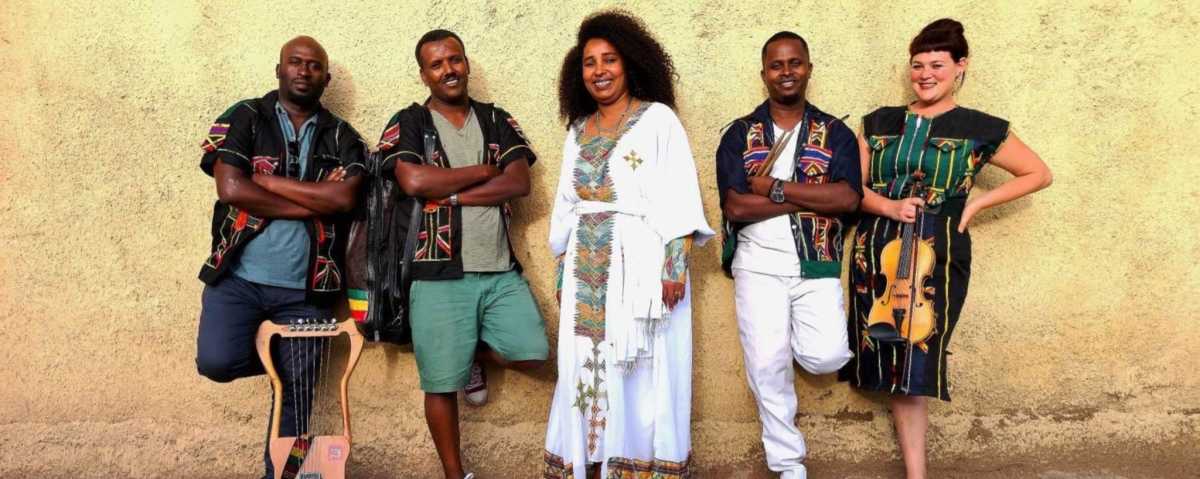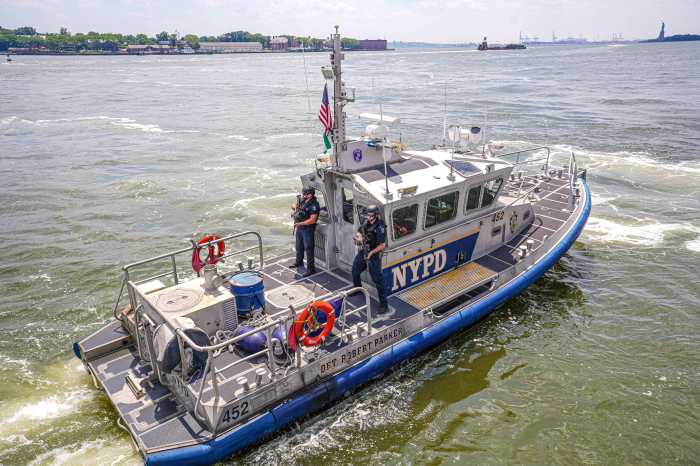Flushing Town Hall will welcome Ethiopian band QWANQWA for a performance like no other as they make their debut United States tour with QWANQWA: Ethiopian Supergroup at 8 p.m. on Saturday, Oct. 29.
“This is one of our most anticipated events of the year,” said Ellen Kodadek, executive and artistic director of Flushing Town Hall. “We are honored to be a stop on QWANQWA’s U.S. debut tour and have our audience experience the great music that QWANQWA has been sharing with the world for a decade — for the first time live from Queens!”
With their roots in traditional East African music, this experimental group is on a mission to further cross-cultural dialogue.
Founded in 2012 by the group’s violinist Kaethe Hostetter, QWANQWA is a group of extremely talented musicians “from the baddest ensembles of Addis Ababa,” Ethiopia’s capital. Their genre of music is intersectional, combining elements of rock, psychedelic, and regional beats from Addis Ababa. The supergroup features Endris Hassen (masinko), Bubu Teklamariam (bass krar), Kaethe Hostetter (violin), Misale Leggese (kebero), and Selamnesh Zemene (vocalist).
Legesse was born in Addis Ababa in Ethiopia. As a child, he fell in love with music, especially the rhythmic sounds of percussion, and started playing in his neighborhood – using pails and empty cardboard boxes as his instruments – imitating the music videos and live performances he saw on TV. Legesse joined the Children and Youth Theater at 17 as part of their in-house band where he quickly emerged as a standout talent. He would go on to become the drummer at Ras Theater, a venerable center of culture established by Ethiopian Emperor Haile Selassie in 1935 and the youngest member of the theater’s house orchestra.
Legesse’s artistry and openness to innovation made him a highly sought-after musician in Addis Ababa. His immense musical talents took him beyond Ethiopian borders and led him to work with musical acts such as The Ex, Ken Vandermark, and Paal Nilsson-Love.
Barago was born in Addis Ababa, Ethiopia, in the Ferensai Sefer neighborhood that also housed the French Embassy. Nicknamed Bubu, Barago fell in love at an early age with the sound of the krar, an ancient Ethiopian lyre. At age 16, he began taking music lessons at a local NGO as part of the Family Planning Association of Ferensa. Soon after, he joined the Kistani Band Gurage Mehaber. A composer as well as a musician, he has written music and lyrics for both himself and other musicians. Heavily influenced by spiritual concerns, many of the albums he chooses to play on have a spiritual or a socially conscious message, whether it be dealing with environmental issues or Ethiopian identity.
As a sought-after studio musician, he has also risen to a position of esteem in the extensive world of Orthodox Koptic Christian music. He has worked on albums with noted Ethiopian traditional musician and social activist Seleshi Demessie and EthioColor, a collective of which he is a founding member.
Taye was born in a small town in the Gonder region in northern Ethiopia. She was born into the bloodline of the Azmari, known as the keepers of a special musical tradition. They are traveling musicians, who use wit, improvisation, and puns in their lyrics, and are known as masters of sem ena worq – literally, wax and gold. This form allows them to speak truth to power in a socially acceptable way while also functioning as deliverers of news. Taye, true to the bloodline, started singing in her childhood. Already a professional singer at age 13, Taye married shortly thereafter and moved briefly with her husband to the town of Mekelle. After a short stay there, they relocated to Addis Ababa, where she has been ever since, growing her family and musical career.
Taye began by singing in small Azmari bets (restaurants) before joining the house ensemble at Fendika in 2000 at first as a backup singer with occasional solos. Over the years, she became a central figure in the ensemble, especially after her colleague, dancer Melaku Belay, purchased the space in 2011 and began developing it as an internationally-renowned cultural venue.
Taye released her first solo album, Salayye al-welem, in 1997 and her second album, Koraw, in 2008. Both albums drew on the traditional Ethiopian folk music of the highlands. Selamnesh has also collaborated with a host of international artists from Deebo Band to Baroque Nomads. She also was featured as a lead vocalist in the Nile Project, a multinational collaboration involving musicians from all of the Nile River countries, leading them into their 6-month US tour. She continues to perform and tour locally and internationally, while also being a mother of four children.
Ahmed began playing masinqo, a traditional Ethiopian one-stringed bowed instrument, at a young age. Born and raised in the important musical city of Wello, Ahmed was surrounded by the different sounds and rhythms from birth.
After moving to Addis Ababa as a teenager, he quickly became the most sought-after masinqo player in the country’s capital. Ahmed has been recording and performing for more than twenty years and is featured on over two thousand domestically produced albums, distributed on all channels of Ethiopian media. He is a frequent guest performer with traditional, jazz, and experimental ensembles in Ethiopia and across the world.
Ahmed served as chief masinqo player at Hager Fikir, a government-sponsored traditional music and theater company established by Haile Sellasie in 1935, holding the position of Permanent Cultural Musician for 13 years. Endris is a founding member of several important groups and is committed to keeping the rich tradition of Ethiopian music and dance alive and fresh.
A choice experimental collaborator, Ahmed has collaborated frequently with Ethiopian singer Mulatu Astatke, Han Bennink, Paal Nilssen-Love, Ken Vandermark, DJ Magabo, the Hip Hop Project Stereognosis, The Ex, Opera Frontier, and more. He has toured internationally for over two decades.
Hostetter is an American violinist, composer, and bandleader, who has been deeply invested in exploring, preserving, and expanding Ethiopian traditional sounds for over 15 years. A founding member of the critically-acclaimed Debo Band, Kaethe recorded many albums and toured the world, including a life-changing tour of East Africa in 2009. Soon after, she relocated to Ethiopia’s capital, Addis Ababa, immersing herself in the country’s deep musical culture. During her eleven years there, she founded a music school and started a new band, QWANQWA, which brought together some of the most accomplished players in Addis Ababa’s music scene.
In-person tickets are $12 for Flushing Town Hall members, senior citizens, and students and $18 for non-members. Those who are unable to attend in-person can view the livestream for $5 at www.youtube.com/flushingtownhall/live. Donations are encouraged.



































